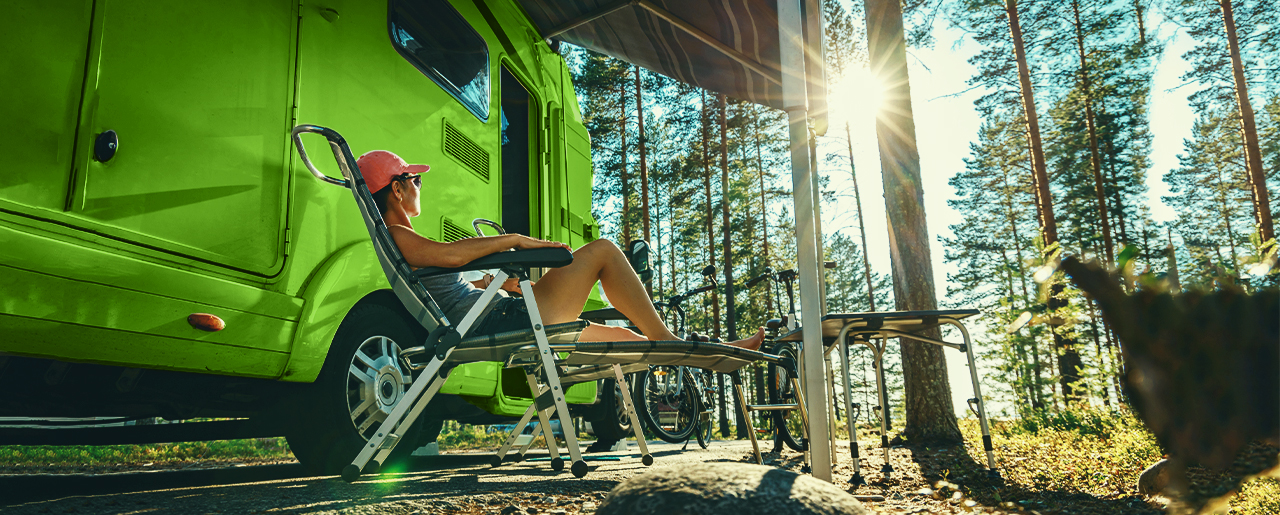
For families or couples looking for a getaway, camping is an excellent source of enjoyment and tranquility, especially in Quebec, with its abundance of places to visit! Before taking your recreational vehicle out of winter storage and packing your things, Assurances Multi-Risques strongly recommends that you check that your recreational vehicle insurance is up-to-date, and, above all, that you have optimal coverage. After having dealt with all the complexities of 2020 and 2021, nobody wants to go through the ordeal of being underinsured in the event of damage or loss involving their recreational vehicle!
Motorhome, trailer, recreational vehicle, Winnebago, tent trailer: choosing the right insurance
We know that it’s not always easy to navigate the world of insurance. That’s why we decided to share our expert knowledge with you!
First of all, you need to take stock of your habits and needs with respect to your recreational vehicle. Each insurance policy has its own specific characteristics, which is why it’s important to choose the one that best fits your individual situation.
Therefore, you shouldn’t rely solely on what your campground neighbour says about their insurance coverage, because it may not be right for you! That’s why it’s best to contact an insurance broker who specializes in insurance for recreational vehicles. They are in the best position to help you assess your true needs.
Civil liability coverage: mandatory in Quebec (Chapter A)
Civil liability coverage is mandatory for recreational vehicles, just as it is for automobiles. Thus, owners of a recreational vehicle or motorhome are required by the Automobile Insurance Act of Quebec to have at least $50,000 in civil liability insurance coverage.
What is civil liability coverage for? It protects you if you are held liable for material damage to another person’s property or physical injuries caused to another person during an accident occurring in Canada or the United States.
But, whether you drive in Quebec or outside the province, AMR highly recommends that you opt for $2M in coverage. Talk to your insurance broker about it!
Optional coverage for damage sustained by your recreational vehicle (Chapter B)
Although this part of your insurance policy is optional, we especially recommend that you don’t overlook it. Here are the different coverages you can choose:
•“Comprehensive coverage”: covers all damages sustained by your RV, except those excluded from the policy (for example, rust is excluded);
•“Collision and upset coverage”: covers damages caused to your RV in the event of collision with an automobile and/or in the event that it tips over, even if you are responsible;
•“All perils other than collision or upset”: covers damage caused by fire, theft, vandalism and broken windows.
•“Specific perils”: this can be selected instead of the “all perils other than collision and upset” coverage. It’s a more affordable option, but more limited as well. It covers damage from fire and theft, but excludes vandalism and broken windows.
Obviously, the cost of your insurance premiums will be calculated based on the coverage you choose. Take the time to properly assess the risk that you are prepared to assume in order to determine the coverage that suits you best!
Coverage for the “movable property” inside your RV
Check whether your insurer includes, without extra cost, comprehensive coverage for theft or damage involving the movables located inside the vehicle or on its site.
It’s an advantage that you should give careful consideration to because, with this coverage, you won’t need to make a home insurance claim in the event of loss or damage involving such property.
Other available types of coverage to consider!
Want to protect your investment even more? Well, other types of coverage exist. Some of these are even sometimes included in the basic policy of certain insurers. But once again, check with your broker! Here are other available coverage types to consider:
•“Travel expenses” (Q.E.F. No. 20A): if you are deprived of your vehicle for several days after a covered accident, it covers certain additional expenses incurred to continue your trip or return home. For example, it may cover certain additional expenses incurred for lodging or meals.
•“Insurance for roadside assistance costs” (Q.E.F. No. 33): covers expenses for roadside assistance, such as when the vehicle runs out of gas or has a flat tire.
•“Change to loss payment” or “Compensation without depreciation” (Q.E.F. No. 43 A and D): similar to replacement value coverage, this covers the amount invested in the purchase of your travel trailer or motorhome.
oIn the event of partial loss, this coverage allows for the replacement of non-repairable parts by new parts.
oIn the event of a total loss of the vehicle, it allows the owner to receive payment for the lesser of the following amounts: the purchase price of the insured vehicle or the price it would have cost to purchase a new vehicle with the same features on the day of the incident.
•Repatriation coverage for your travel trailer: if the vehicle pulling your travel trailer is stolen or is involved in a total loss accident, this additional coverage will cover the expenses incurred to bring your travel trailer back to your home.
In conclusion
Whether you are looking for insurance for your new RV or already have an insurance policy, AMR recommends that you check with your insurance broker to be sure that the coverage types that you decide to purchase perfectly meet your needs, because your needs change and evolve along with your personal situation. It would be logical, then, for your recreational vehicle’s insurance policy to follow suit!